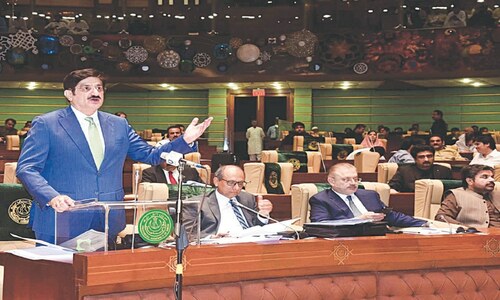KARACHI: The International Union for Conservation of Nature (IUCN) chapters in Pakistan and China have proposed to the two governments to take care of environmental concerns in the development of the China-Pakistan Economic Corridor (CPEC) and hold consultations with the stakeholders in this regard.
IUCN country representative Mahmood Akhtar Cheema stated this on Monday on the sidelines of a programme held at the organisation’s office to welcome the chairperson of the IUCN Commission on Ecosystem Management in Karachi.
Sharing how the organisation is facilitating the governments of China and Pakistan over the CPEC development, Mr Cheema said that the organisation had contacted both governments and suggested consultations, with the aim to include stakeholders such as representatives of civil society.
“The CPEC passes through several protected areas and what we are suggesting is not just ways to secure these areas, but also to identify and declare more parts of land as protected which are of ecological significance,” he explained.
The ambitious project included a number of schemes, for instance, construction of various industrial zones, roads and railway links, power plants, and a port in Gwadar; it is important to take care of environmental concerns in order to have sustainable development, he added.
To a question, Mr Cheema said the IUCN intervention would be based on case-to-case basis and opportunities for ‘green jobs’ needed to be explored.
Recently, he pointed out, the IUCN-Pakistan representatives attended an eco-forum in China along with Pakistan climate change officials where environmental concerns regarding the CPEC were also discussed.
The organisation planned to hold a stakeholder consultation over the project by the end of the year.
Meetings with Pakistani officials were also held in Islamabad and the government was in the process of developing a better understanding of the project, he said.
Earlier at the programme, chairman of the IUCN commission, Dr Piet Wit shared details of the work being done by the body over the last four years.
He said that the commission worked on specific ecosystems, such as wetlands, mountains, and fisheries, and deep-sea mining and it had over 20 thematic groups. Some newer thematic groups included arctic ecosystems, nanotechnology and aquaculture.
He encouraged the commission members to come forward with new thematic areas to focus on.
Responding to a question, Dr Piet said that the commission maintained a Red List of Ecosystems which was compiled using the same scientific process as that of the IUCN Red List of Species.
He also spoke about the importance of inclusive thinking where conservation work was concerned and said this approach had led to the IUCN’s increased role in disaster-risk reduction.
The meeting ended with a vote of thanks and attended by IUCN staff and commission members, among others.
Published in Dawn, July 19th, 2016













































Dear visitor, the comments section is undergoing an overhaul and will return soon.